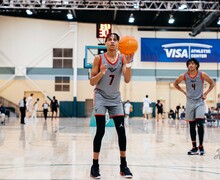3 reasons for the defense’s decline
The less-than-obvious reason the offense received so much of the offseason focus was the quiet fact that the defense played solidly during SU’s 1-10 campaign. Greg Robinson’s first-year unit ranked 57th overall in the nation, including 21st against the pass.
Logic reasoned the Orange defense would continue to hold the team together in 2006 while the offense started to gel.
As Syracuse prepares to host Louisville in its eighth game of the season on Saturday at noon in the Carrier Dome, the defense has not held up its end of the bargain.
SU now stands 109th out of 117 teams in total defense, surrendering 410 yards per game. The Orange is 111th in run defense and 73rd against the pass.
There are three major reasons for the defense’s significant drop in performance:
1. Long running plays
Greg Robinson brushed aside the three long runs of at least 30 yards (one a 70-yard touchdown) gained by Pittsburgh, reminding the media his defense stopped everything else the Panthers tried.
There was no such talk after West Virginia’s space-age running option scorched the Orange for four touchdowns of at least 30 yards.
‘I am concerned,’ Robinson said in his weekly Sunday press conference. ‘We talked about it (Sunday). We have to figure out how to remedy it in a quick fashion. What does that entail? Time will tell.’
The main lesson from the head coach: contain.
Robinson preaches an attacking style defense that encourages players to run to the ball. But against quick runners like Pitt’s LaRod Stephens-Howling and WVU’s Pat White and Steve Slaton, the over-pursuit backfired.
The head coach said his players must be more disciplined and funnel to the ball so there’s no space for cutback moves.
‘You have to leverage the ball back to other people, so that is basically what it comes down to,’ Robinson said.
2. Bubble screens
It wasn’t an issue against West Virginia, but the quick, immediate passes to the outside burned Syracuse against Wyoming and Pittsburgh.
The two teams completed 53-of-74 passes, a 71.6 percentage, for 503 yards. Wyoming even managed a successful pass attack while using two different quarterbacks.
Cornerback Terrell Lemon admitted he and fellow starter Tanard Jackson have played off the ball more this season, but only because this year’s opponents are spreading the defense out more with three and four wide receivers.
Lemon said playing back instead of pressing coverage allows the secondary to watch the quarterback more – which he said was crucial when he has so many options to throw the ball. But he didn’t excuse opponents’ success with the bubble screens.
‘They’re going to make plays, but you just got to minimize it and hold down what should be a 15-yard pass to five yards,’ Lemon said. ‘That’s the best you can do against a team like this.’
At least Syracuse knows it’s coming.
‘We definitely are going to get it,’ Lemon said. ‘But we’ll be more prepared for it this week.’
3. Tackling
Even when Syracuse is in position to prevent a long play on the ground or from a bubble screen, the defense hasn’t always made the play.
Tackling wasn’t the main concern against West Virginia, considering the Mountaineers’ Pat White and Steve Slaton ran nearly untouched for touchdowns, but in the weeks prior the problem became notable.
Outside the Syracuse locker room in Morgantown, W.Va., cornerback Tanard Jackson pinpointed wrapping up ball carriers as a crucial goal for the defense the rest of the season.
‘Missed tackling, we’ve got to minimize the bigger gains,’ Jackson said. ‘You have to really focus in practice and prepare, we do drills, we work with it all the time. It’s just a matter of converting from the practice field to the playing field on Saturdays.’
The pressure is on everyone, too. Mistakes have come from the defensive linemen, linebackers and secondary.
‘I definitely expected a lot coming in with our defense (this season), but I still am,’ Jackson said. ‘I still believe can do some special things this year as long as we keep working.’
Published on October 19, 2006 at 12:00 pm





